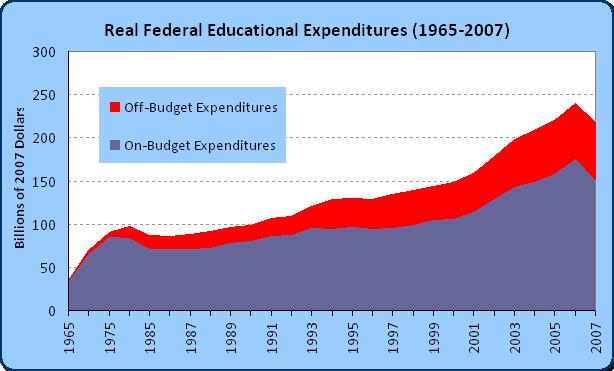The brand of totalitarianism we are moving toward today is less “in your face” than we saw in the past (or what Hayek called “Hot Socialism”) – but it is tyrannical socialism nonetheless. For example, rather than the environmental engineers in the White House and Congress offering up a carbon tax to deal with global warming, we get a convoluted, rent-seeking laden cap-and-trade bill that will do nothing but enrich special interests and do nothing for the environment. We get labor policy crafted to protect the “declining” unions (i.e. such as giving them what remains of Chrysler and GM) meanwhile the rise in occupational licensing (much harder to see) has more than compensated for this “loss” and much to the detriment of potential entrepreneurs around the nation.
I encourage my readers to look beneath the rocks of whatever government programs are offered up – for beneath them you are sure to find many interesting creepy crawlies. The following chart illustrates just one such creepy crawly.
It was derived from a Digest of Education Statistics Table. Note that in real terms, federal educational expenditures, on-budget, have increased by 342% since the Great Society (or 4.8% per year), off-budget expenditures have exploded (i.e. those not subject to congressional appropriation). From virtually non-existent at the beginning of the Great Society, off-budget educational expenditures have risen to 30.5% of total educational expenditures, an increase of 20.9% per year over that time period. By the way, spending over $200 billion federally on education is not too shabby, is it? Or do such numbers mean nothing to you when we have entered the era of multi-trillion dollar deficits?

Wow!
What is the definition of an on-budget, or an off-budget expenditure? For education, I mean. Or generally.
Looks like 50 billion (per year?!) is off-budget. Any idea where that ends up? (Maybe part of it is for fifty million copies of The Elements of Style this year, and another fifty million copies of The Road to Serfdom next year. )
I bet nobody running for my local school board can give me a straight answer to this question. I bet Ed Rendell can’t, either, but he never gives a straight answer to anything.
F/Y/I, in 1963 the national high school debate subject was whether the federal government should fund public education
Wintercow, I do not know whether you go back that often to commentary, but here’s an aside that may be of interest, since the title of your post was an allusion to Bastiat.
In the op-ed of the Journal was a piece by a Duke economics professor who referred to “What is Seen, and What is Unseen,” this time applying the principle to judging. You likely know the author. Hell, he might be Speedmaster. My copy of the paper is downstairs, otherwise I would give you the name.
I am encouraged that there is at least one other economics professor who is not a slave. Hope this brightens your day.